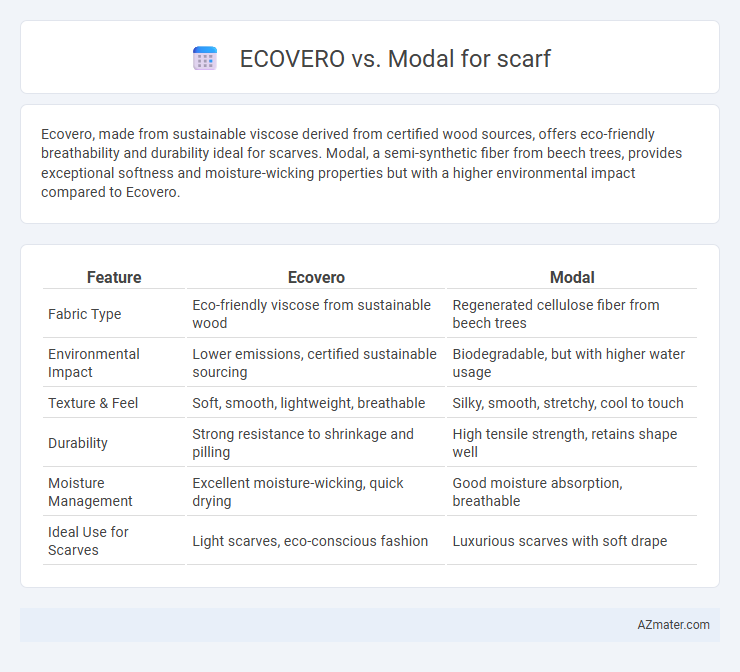Ecovero, made from sustainable viscose derived from certified wood sources, offers eco-friendly breathability and durability ideal for scarves. Modal, a semi-synthetic fiber from beech trees, provides exceptional softness and moisture-wicking properties but with a higher environmental impact compared to Ecovero.
Table of Comparison
| Feature | Ecovero | Modal |
|---|---|---|
| Fabric Type | Eco-friendly viscose from sustainable wood | Regenerated cellulose fiber from beech trees |
| Environmental Impact | Lower emissions, certified sustainable sourcing | Biodegradable, but with higher water usage |
| Texture & Feel | Soft, smooth, lightweight, breathable | Silky, smooth, stretchy, cool to touch |
| Durability | Strong resistance to shrinkage and pilling | High tensile strength, retains shape well |
| Moisture Management | Excellent moisture-wicking, quick drying | Good moisture absorption, breathable |
| Ideal Use for Scarves | Light scarves, eco-conscious fashion | Luxurious scarves with soft drape |
Introduction: Ecovero vs Modal for Scarves
Ecovero fibers are derived from certified sustainable wood sources, offering eco-friendly benefits and biodegradability for scarf production. Modal, a type of rayon made from beech tree pulp, provides exceptional softness and breathability, enhancing scarf comfort and durability. Choosing between Ecovero and Modal for scarves involves balancing environmental impact with texture and performance preferences.
What is Ecovero?
Ecovero is a sustainable viscose fiber manufactured by Lenzing, derived from certified renewable wood sourced from responsibly managed forests to minimize environmental impact. It features a lower carbon footprint and reduced water consumption compared to conventional viscose, making it ideal for eco-conscious fashion items like scarves. Ecovero's production process adheres to strict environmental criteria, ensuring transparency and sustainability in textile manufacturing.
What is Modal Fabric?
Modal fabric is a type of semi-synthetic fiber made from beech tree pulp, known for its softness, breathability, and moisture-wicking properties, making it an excellent choice for scarves. Compared to Ecovero, which is a sustainable viscose fiber derived from certified wood sources, modal offers superior drape and a silky smooth feel that enhances comfort and style. Both fabrics emphasize eco-friendliness, but modal is particularly prized for its durability and resistance to shrinkage and pilling, ensuring scarves remain luxurious over time.
Ecovero vs Modal: Raw Material Source
Ecovero fibers are derived from certified sustainable wood sources, primarily from FSC and PEFC certified forests, ensuring eco-friendly and renewable raw materials. Modal is typically produced from beech tree pulp, which can vary in sustainability depending on the manufacturer's sourcing practices. Ecovero offers a more transparent and environmentally responsible raw material supply chain compared to traditional Modal fibers used in scarf production.
Sustainability Comparison
Ecovero fibers, derived from certified sustainable wood pulp, offer a lower environmental impact by using 50% less water and 30% less energy compared to conventional viscose, making them a strong sustainable choice for scarf production. Modal, particularly when sourced from FSC-certified beech trees, features high biodegradability and superior moisture retention but often involves more intensive chemical processing that can affect its overall eco-friendliness. Evaluating both materials for sustainable scarves involves considering Ecovero's reduced resource consumption against Modal's natural fiber qualities and sourcing certifications.
Softness and Comfort for Scarves
Ecovero and Modal fibers both offer exceptional softness and comfort, making them ideal choices for scarves worn close to the skin. Ecovero, a sustainable viscose made from certified wood pulp, provides a smooth, breathable texture that is gentle on sensitive skin and moisture-wicking for all-day comfort. Modal, derived from beech tree fibers, boasts a silky softness with excellent drape and durability, ensuring scarves remain luxuriously comfortable while resisting shrinking and pilling.
Breathability and Moisture Management
Ecovero fabric, made from sustainably sourced viscose, offers excellent breathability and superior moisture management for scarves, ensuring comfort during extended wear by wicking away sweat effectively. Modal fibers are also breathable but tend to retain more moisture compared to Ecovero, making them less efficient in regulating humidity around the neck. For scarves prioritizing lightweight comfort with optimal airflow and moisture control, Ecovero remains the preferred choice in sustainable textiles.
Durability and Care Instructions
Ecovero fabric offers enhanced durability for scarves with its sustainable viscose fibers, maintaining shape and color after multiple washes. Modal scarves provide a soft feel but may require gentler care, including hand washing or delicate cycles, to preserve fabric integrity. Both materials benefit from air drying and avoiding high-heat ironing to extend scarf longevity.
Price and Availability
Ecovero fibers, derived from certified sustainable wood sources, typically have a moderate price point but offer broad availability in scarfs due to their eco-friendly appeal and widespread production. Modal, made from beech tree pulp, often comes at a higher price but is valued for its silky texture and durability; however, it can be less readily available in some scarf markets depending on geographic location and manufacturer. Both materials cater to different consumer priorities, with Ecovero prioritizing sustainability and cost-effectiveness, while Modal emphasizes luxury and softness.
Which is Better for Scarves?
Ecovero, a sustainable viscose fiber certified by EU Ecolabel, offers better environmental benefits for scarves due to its lower water consumption and reduced greenhouse gas emissions compared to Modal, which is a regenerated cellulose fiber known for its softness and durability. Modal provides a silky texture and excellent breathability, making it ideal for luxury scarves, while Ecovero combines eco-friendliness with comparable softness and color retention. Choosing Ecovero is preferable for eco-conscious consumers seeking sustainable scarf options without compromising quality.

Infographic: Ecovero vs Modal for Scarf
 azmater.com
azmater.com